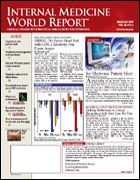Publication
Article
Internal Medicine World Report
New Combo Therapy Improves Lung Function in Persistent Asthma
Author(s):
From the American College of Allergy, Asthma & Immunology
PHILADELPHIA—Treatment with budesonide/formoterol (Symbicort) results in significantly greater improvements in lung function and a lower risk of asthma-worsening episodes compared with budesonide (Pulmicort) or formoterol (Foradil) monotherapy, according to data presented at the American College of Allergy, Asthma & Immunology annual meeting.
This 12-week, randomized, double-blind, placebo-controlled trial involved 480 patients (aged 12-77 years; 62% women) with mild-to-moderate persistent asthma who were previously treated with an inhaled corticosteroid. All patients were randomized to 1 of 4 twice-daily treatments (2 inhalations per treatment): budesonide/formoterol 80 μg/4.5 μg via pressurized metered-dose inhaler (MDI); budesonide 80 μg via pressurized MDI; formoterol 4.5 μg via dry-powder inhaler; or placebo.
Lung function was assessed throughout the 12-week study based on predose forced expiratory volume in 1 second (FEV1), 12-hour mean FEV1 after dosing on day 1 and after weeks 2 and 12, and predose morning and evening peak expiratory flow.
P
P
P
After 12 weeks of treatment, patients in the combination therapy group outperformed all other groups in 2 of the primary end points: improvements in predose FEV1 ( ≤.005) and predose morning and evening peak expiratory flow ( <.001). For the third primary end point, 12-hour average postdose FEV1, the combination therapy was superior to budesonide or placebo (<.001), but the difference was not significant compared with formoterol monotherapy.
Coinvestigator Phillip Korenblat, MD, of Washington University School of Medicine, St. Louis, noted that the improvements in lung function parameters were maintained with the combination therapy and did not diminish over time. He also said that the incidence of asthma worsening was lower in the budesonide/formoterol group than in the formoterol or placebo groups.
No significant between-group differences were seen in postdose electrocardiograms, laboratory values, results of Holter monitoring, and vital signs compared with baseline.
“The cardiovascular evaluation, which has been important with long-acting beta-agonists, showed there were no significant abnormalities,” Dr Korenblat told IMWR. “So, it appears we have a newly approved medication that is both efficacious and safe. It not only gives long-term bronchodilatation, but it also gives rapid action.”
He emphasized that despite its rapid onset of action, “it is approved for controlling asthma, not rescue.”
Side effects with the combination were similar to those with budesonide or formoterol monotherapy and were mostly mild or moderate in intensity. The overall incidence of asthma-related adverse events was 2.5%, but there were no such events reported in the budesonide/formoterol group.
“This new agent appears to be safe. Many of us are concerned about long-acting beta-agonists, but in this study we found no increased risks,” said Dr Korenblat. “It looks like it is going to turn out to be a highly safe and effective tool as a control for asthma.”






